Top 10 Cloud Integration platforms
November 29, 2024 | Editor: Michael Stromann
11
Cloud services that allow to integrate your data-flows and processes across different clouds and apps.
1
Zapier connects the web apps you use to easily move your data and automate tedious tasks. Connect the apps you use to easily move data between them. Use simple, event-based automation to avoid repetitive tasks.
2
One platform for APIs and integrations. Build an application network with secure, reusable integrations and APIs designed, built, and managed on Anypoint Platform.
3
Microsoft Power Automate (earlier Microsoft Flow) - is a versatile automation platform that integrates seamlessly with hundreds of apps and services and allows users to create custom workflows without coding through a drag-and-drop interface.
4
A single platform that automates work and powers innovation across your business.
Better Integrations Through Intelligent Automation
5
Dell Boomi allows you to connect any combination of Cloud, SaaS, or On-Premise applications with no appliances, no software, and no coding. With Boomi you will achieve unprecedented implementation speeds that are just not possible with software packages, hardware appliances, or custom coding. Using only your web browser, you can sign up, log in and then build and deploy your integrations at whatever pace you require.
6
Jitterbit is the leading agile cloud integration solution for today's modern architecture, rapidly connecting any on-premise, Cloud, Social, and Mobile apps. Jitterbit is a graphical tool that allows for the transport and transformation between data types and sources, including web services, XML files, ODBC and JDBC databases, EDI files, flat and hierarchic file structures.
7
Talend offers a single suite of cloud apps for data integration and data integrity to help enterprises collect, govern, transform, and share data.
8
Social, Mobile, Analytics, Cloud Computing and The Internet of Things. If you’re feeling SMACT, it’s time to get Snapped. SnapLogic delivers a powerful, yet easy to use Elastic Integration platform for “citizen integrators” to connect all sources, sizes and types of data at cloud speed.
9
Tray.io is the most advanced integration platform for connecting the tools you use every day. Easily streamline processes using our visual workflow editor.
10
IFTTT is a service that lets you create powerful connections with one simple statement: If This Than That. Channels are the basic building blocks of IFTTT. Each Channel has its own Triggers and Actions. The this part of a Recipe is a Trigger. Some example Triggers are “I’m tagged in a photo on Facebook” or “I check in on Foursquare.” The that part of a Recipe is an Action. Some example Actions are “send me a text message” or “create a status message on Facebook.”
11
Automate.io connects all your cloud applications with amazing ease. Automate marketing, sales, payments or any business processes in minutes.
12
Automate business workflows by connecting your apps with Zoho Flow. Build smart integrations to break the information silos in your business.
13
Integromat is the most advanced online automation platform. We've redefined work automation so everyone can get back to what matters the most.
15
Unito provides detailed, two-way, live task and project syncing between tools, making your team more efficient.
Important news about Cloud Integration platforms
2023. Zapier launches Canvas, an AI-powered flowchart tool
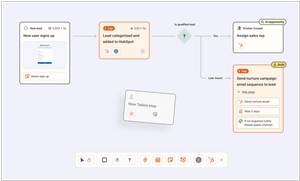
Zapier has unveiled Canvas, a innovative tool designed to assist users in planning and visualizing their crucial business processes. The tool combines intuitive visual diagramming features with AI capabilities to aid users in transforming their processes into Zapier-based automations. Canvas serves as a comprehensive platform where users can map out their processes from start to finish and even modify the elements connected to Zapier directly within the interface. Notably, Zapier envisions expanding Canvas's functionality to allow users to edit any components, whether or not they are linked to Zapier, directly within the tool. In essence, Canvas functions as both a basic flowchart diagramming tool for process documentation and as an interface for editing the connected components. Additionally, Zapier has made Tables, its automation-focused database service, available to all users, further enhancing its automation capabilities.
2023. Digibee raises $60M to help companies integrate their software apps
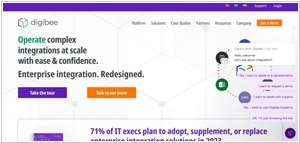
In a universe that was probably more complex and chaotic than it had any right to be, Digibee, an enterprise-leaning, low-code integration wizardry device—though it insisted on calling itself a "platform"—just bagged a galactic-sized $60 million in Series B funding, presumably to continue its mission of making reality just that much more interconnected and confusingly simple. Armed with a fantastical assortment of automated gadgets and wizard hats (well, integration tools, really), it assists organizations in stitching together all manner of applications across different dimensional planes—er, environments. Its cloud-based cerebral cortex handles the orchestration of data flows, linking earthbound processes with those whimsically floating in the cloud, all while keeping service apps and enterprise data singing in near-perfect harmony. And as if that wasn’t enough, Digibee empowers its users to craft dazzling integration flows—or pipelines—using a colorful palette of enterprise apps, files, and suspiciously helpful tools. Oh, and let’s not forget the enchanted modules pre-loaded with business logic, ready to be passed around like a spell book among teams and partners, making reuse as painless as borrowing a towel from a friendly intergalactic traveler.
2023. FlowX.ai raises $35M for its AI-based approach to application integration
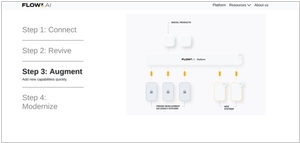
In a world where ancient software systems grumbled and creaked under the weight of their own obsolescence, there emerged FlowX.ai, a company with grand designs to unite these legacy titans with their slick, modern counterparts into one seamless platform for creating and running all manner of applications and services. Armed with an improbable $35 million in Series A funding, FlowX.ai has endeared itself to the financial sector, roping in stalwart clients like BNP Paribas, OTP, Banca Transilvania, and Alpha Bank—because, as everyone knows, banks are rather fond of miraculous transformations. Their success, of course, owes a nod (or several) to trusty sidekicks like IBM and KPMG, who assist with system integration and the tricky business of drumming up new users. For now, the company has its eyes firmly fixed on the financial world, but don’t be fooled; world domination (or at least a gradual expansion) lurks in the background. FlowX.ai has become rather adept at helping venerable financial institutions launch shiny new services—cleverly crafted to either delight their own employees or challenge the audacity of neobanks. Since bursting onto the scene in 2021, they’ve claimed that roughly 30 million users have interacted with creations born of their platform. And yes, it’s entirely possible some of those users didn’t even realize they were participating in a digital evolution.
2022. Levity wants to give Zapier a run for its money
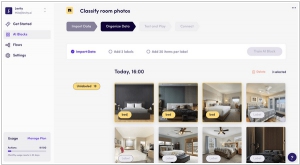
Zapier and IFTTT are currently major platforms for creating automation rules for text or enabling two apps to communicate via APIs. However, these are often “overkill” when it comes to handling straightforward tasks required within businesses. The new Berlin-based startup, Levity, which has developed a method for businesses to create AI-powered, “no-code” rules for automating tasks in a user-friendly way for non-technical individuals, has raised $8.3M. Levity enables companies to utilize simple templates to automate workflows, with an underlying AI that handles the complex processes, according to the firm. It leverages NLP and computer vision in a single horizontal platform to interpret unstructured data types, such as images, text and documents. Levity’s clientele spans industries including fashion, real estate, shipping, marketing, social media, scientific research and more.
2022. Pipedream lands $20M to connect disparate apps
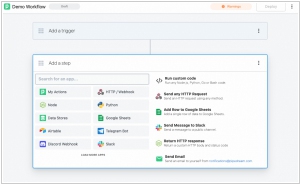
Pipedream, an integration platform for creating workflows and linking cloud services, has secured $20 million in funding. Pipedream enables users to build workflows using open-source connectors to APIs and extensions written in Node.js, Python, Go, or Bash for custom logic. Pipedream is similar to workflow automation platforms like Zapier, Integromat, Workato and MuleSoft — but with a stronger focus on developers. Any user, client, or partner can add an integration to the closed-source part of the platform, while developers can include proprietary or internal integrations that aren’t meant to be shared with the broader Pipedream community.
2022. Low-code integration platform Digibee raises $25M
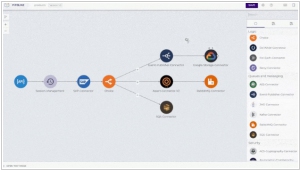
Digibee, a low-code integration platform, that is doing what all low-code integration platforms are apparently doing right now, has raised $25 million in Series A funding. Digibee simplifies the process for businesses to create and implement integration workflows without needing to write any code. While many other platforms offer similar functionality, one distinguishing feature of Digibee is its focus on transforming those integrations into reusable business logic. A year ago, the company also introduced what it refers to as “Capsules,” which are bundles of common integrations that can be shared across organizations.
2021. SnapLogic raises $165M to help enterprises integrate and automate their disparate apps and data
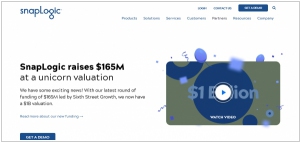
SnapLogic, which has developed a platform to connect enterprise applications and data, has secured $165 million. Competing with companies like Workato (which raised funds earlier this year), Tray.io, MuleSoft and others, SnapLogic initially gained recognition as a company that helped businesses integrate and utilize data across various applications. This area proved to be highly attractive for enterprises that had adopted numerous applications and systems across multiple clouds, containers, data warehouses and on-premise data centers over the years; and were now managing a wealth of data across these sources that they needed to optimize and leverage more effectively.
2021. Merge raises $15M for its B2B integrations platform
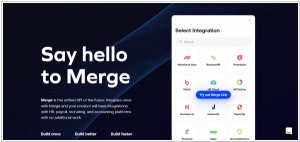
Merge, an integration platform specializing in B2B applications, has secured $15 million in Series A funding. Along with this new investment, the company also announced partnerships with HR providers BambooHR and applicant tracking system Lever. Merge does not view itself as a workflow automation platform aiming to compete with Microsoft’s Power Automate and similar solutions. Instead, the company is positioning Merge as a tool to assist B2B businesses in creating customer-facing integrations. The average B2B organization needs to connect with numerous vendors and these integrations can often be fragile. Merge provides a unified API that can power all of these customer-facing interactions.
2021. Primer raises $50M for a framework designed to help merchants build more powerful payment flows
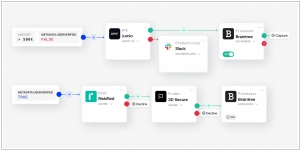
In the sprawling, perplexing universe of online payments, where merchants often find themselves lost in a tangled web of complex integrations, Primer emerges like the improbably helpful Hitchhiker's Guide to Payment Stacks. With a drag-and-drop framework that seems almost too sensible for this particular corner of the cosmos, Primer has, in a mere 20 months, ensnared the attention of merchants far and wide, sparking a flurry of enthusiastic take-up. Bolstered by a new Series B round of $50 million, which bestows upon it a rather cosmic valuation of $425 million, Primer is boldly expanding its intergalactic reach to do... well, much, much more. It now operates in over 20 countries, offering an impressive arsenal of 45 integrations. Users can seamlessly add Stripe, Apple Pay, Adyen, or Braintree (and that’s just the payment portals) to their workflows, alongside other mysteriously essential tools like Riskified’s fraud detection and TaxJar’s sales tax calculations. The clever bit? Primer generates a tidy line of code for each payment workflow, allowing developers to integrate it all as if payment processing were just another part of the script in the great cosmic play of e-commerce.
2021. Tyk raises $35M for its open source approach to enterprise API management
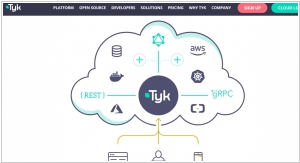
Tyk, which has developed a method for users to access and manage multiple internal enterprise APIs through a unified interface via GraphQL, has raised $35 million. Tyk has coined a term to describe its approach to handling APIs and the data they generate — “universal data graph” — and today its tools are utilized by around 10,000 companies, including major enterprises like Starbucks, Société Générale and Domino’s. According to the developers, other API management solutions available in the market, such as Kong, Apigee (now part of Google), 3scale (now part of RedHat and thus IBM) and MuleSoft (now part of Salesforce), are not as adaptable as Tyk.

















